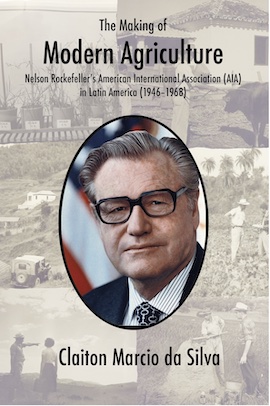The Making of Modern Agriculture
Nelson Rockefeller’s American International Association (AIA) in Latin America (1946–1968)

Claiton Marcio da Silva
Exported Experts, Latin American Farmers and Negotiating Modernity
The Making of Modern Agriculture addresses how an American philanthropic agency – the American International Association for Economic and Social Development (AIA) – influenced the course of agricultural development in Latin America during the Cold War. Operating from 1946 to 1968, the AIA was an endeavour designed by the multimillionaire and politician Nelson Aldrich Rockefeller (1908–1979) to maintain the United States’ influence on foreign policy through Latin America. With a major presence in Venezuela and Brazil, the AIA also conducted rural development programmes in Chile, Costa Rica, as well as studies of Trinidad & Tobago, Paraguay, Peru, China and India. With an unwavering faith in the principles of science and technology, the AIA exported experts who began their careers in reformist organisations during the New Deal and later expected to accommodate similar programmes in Latin America during and after WWII.
By exploring previously unpublished primary sources, The Making of Modern Agriculture demonstrates the role of Latin American elites and governments in adapting and rejecting programmes of US origin. Based on numerous examples, the book demonstrates how the encounters and clashes between foreign experts, governments, and local technicians with affected populations resulted not only in the adaptation of exogenous projects, but, in a certain way, forced the AIA to rethink its strategies and formulate new models to be adopted later in other Southern Hemisphere countries. The book also demonstrates, from an approach mingling history of science, environment and international relations, how the encounters between experts, politicians, and rural populations rendered the notions of development and modernisation even more polysemic.
Da Silva illustrates how, in addition to the notable Ford, Rockefeller and Carnegie foundations, agencies less known to academics played a differentiated and fundamental role in the geopolitics of Latin America and the United States. As the book demonstrates, the AIA is one of the fundamental references for the establishment of Harry Truman’s Point Four and, among other legacies, influenced the formation of the largest agricultural extension service outside the United States, in Brazil. Finally, it contributes a historical perspective to current debates about how Latin America has become a paradoxical agricultural power, producing commodities for global markets even as environmental injustice is dramatically advancing.
‘Da Silva has made an important contribution to the history of Latin American agricultural development campaigns’
Shane Hamilton, Agricultural History Review
‘Perhaps the most critical
Timothy W. Lorek, Hispanic American Historical Review
aspect of the AIA story in Brazil (and Venezuela) is the direct link that it reveals between
corporations and agricultural policies in rural Latin America.’
THE AUTHOR
Claiton Marcio da Silva is Associate Professor of History at the Universidade Federal da Fronteira Sul (UFFS), Brazil, with a PhD in history of sciences.He has written over 30 articles on history of science and environment, in English, Portuguese, Spanish and Italian. His first edited book in English is The Age of the Soybean (WHP 2022), with Claudio de Majo. He has been engaged with peasant social movements looking for alternative paths to social and environmental change, through programmes such as the Soybean Social and Environmental Observatory (Soyacene) and the Laboratory of Environmental History, being a founding member of both. He has been a visiting researcher at the University of Guelph and the Massachusetts Institute of Technology and a research fellow at the Rockefeller Archive Center, Rachel Carson Center for Environment and Society, The Maria Sibylla Merian Center for Advanced Latin American Studies (CALAS), Eccles Centre for American Studies at the British Library and the University of Oulu.
Publication date, 31 March 2023
ISBN 9781-912186-693 (HB) £65. 300 pp.
